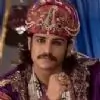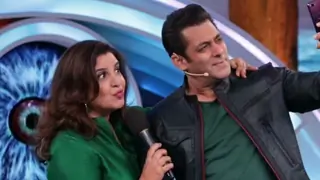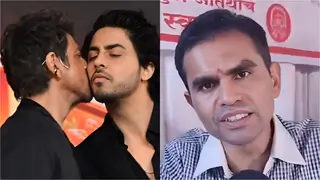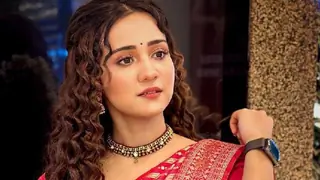I wish that the CVs had not made a mockery of Ashok in this Knowledge competition - phase 1. In the name of forward thinking, the CVs seem to be superimposing their views on Ashok the Great. And we need to remember that he was from his century and not the 21st century. While it is a fact that even in the 21stcentury the context is not lost, just that too much confusion in the name of modern thinking prevails.
My reason for the above bold statement. This is my view based on my limited understanding of the Sastras, which verily came from the holy mouth of the Supreme Lord. Sastras were not written by someone sitting under a tree. Even Veda Vyasa, revered as no.1 is Sastras, only consolidated and organized the Sastras, but never wrote them on his own.
First question- Ashok's argument on the Arthasastra, a treatise by Chankaya - it is now projected in the serial that Ashok is even questioning the acumen of Chanakya, which is not true in reality and was sickening to watch also. In the first place, Chanakya, given his razor sharp intelligence, would not have given room for such lacuna. Maybe Ashok has not learnt it properly and also his interpretation of the text comes into picture. Sushim only parroted and need not have necessarily understood the deeper meaning. And Ashok questioning based on Suhim's parroting. These may have been borne in mind by the CVs while writing the script. Anyway, Ashok is the hero of the show and so he has to supersede even Chanakya! This is the only sense that I get here.
Coming to the varna (caste system) question, looks like the CVs are keen to project Ashok as someone who thinks differently and ahead of his time. So, he questions everything, nothing wrong in questioning - but the question needs to be in perspective. He should have understood the essence and factored all elements before posing a question. This way questions are more intelligent and meaningful. On one side Dharma has dumb arguments for death sentence and now Ashok is also not spared from this CVs creation - looks like an activitist is out there in the cover of CV.
Ahsok's Argument:
- Varnas (caste system) are not wrong but its interpretation is wrong.
- Freedom to choose one's path (varna / caste) should be there.
- Birth to a parent need not constrain one's path - one can choose any path and excel otherwise also. Example: Karna born to a charioteer (Shudra) chose to become a great warrior (Kshatriya). Viswamitra became a sage (Brahmana) though he was born a King (Kshatriya).
- Kings (Kshatriyas) are all serving the people and so they are also Shudras technically.
- There is no high or low caste. All varnas are equally important just as the limbs of the body.
Rebuttal:
CVs gave only the sadhu' dialogue to the panel. So, let me question on behalf of the supposed to be smart experts there!J
Exactly Ashok (read as CVs), varnas are not wrong, its interpretation is wrong. And it may apply to you also.
There is no limitation in freedom to choosing one's path. There are plenty of examples in doing so, but how optimal have they been in their delivery is also something one needs to ponder upon.
Let me take your own examples first CVs:
Karna - in the first place he was born to a Kshatriya not a Shudra (charioteer). He was only brought up by them. So, he had the Kshatriya quality in him anyway.
Vishwamitra - he converted to a sage, but with much difficulty after so many failures. His ego was a big block as we know. We also know his ego was the very reason why he even wanted to become a sage and not for any spirtual attainment per say. And the purpose was lost here. He might have fared better as a king.
I will give another example also on your behalf CVs. Dronacharya - he was a Brahmin and a teacher. But he also chose to fight on behalf of the Kurus, playing the role of a Kshatriya. None could win him over given his prowess, after all he was a teacher. But if see, he could not the muster the strength to fight on when he learnt about his son's death. This is the difference. He played the role of a Kshatriya but by nature still a Brahmin and that was his weakness, which the opponents leveraged in the war. And Dronacharya laying down the weapons was a big loss to the Kauravas. Contrast this to Arjuna, when he heard of Abhimanyu's death he chose to revenge. This is the nature of a true Kshatriya. In our own CAS show, Dharma is struggling to cope up to royal and Kshatriya life because of her innate Brahminic qualities.
Kings are essentially Shudras as they serve was another argument - sorry, but I could only laugh at this silly argument. As my counter straight would be that the kings also rule, go to war etc. In that sense they are Kshatriya. So what is your conclusion dude, are they Kshatriyas or Shudras? It only shows your ignorance on the subject. A person can have the quality and also perform the act of multiple varnas, but the predominant quality is what the varna he belongs to. Let us take a 21st century example, as you are forward thinking my dear CVs. In an office environment today, we have CEOs and staff at different levels. Now both serve the organization. But are we going to say that the CEO is also an ordinary staff? No, he is recognized for his position, more than that his role. Now, how is this acceptable in our modern thinking? Are we not being partial? The CEOs and the housekeeping boys should be treated on par, given the same salary - isn't this a fair ask? Let me take another example. We all talk about equality and human rights. How many of us will invite a beggar to a dinner and dine with him as is. Why don't we do this? Why do we treat him low? Because, he is poor and unkempt? Such bias is not fair in my view. The bias is based on the position or economic status, that's the difference. But it is still a bias and partiality in my view. My thinking is ahead of 21stcentury and the thinkers of today should be saying sadhu sadhu' for my forward thinking. But is this argument acceptable to you. Would you find it logical? Would you credit it as a modern thinking, because it challenges things blindly or it is different thinking irrespective of the rationale behind it? Would you agree that such biases based on position or economic strata are wrong?
So, now what would be your counter argument for this, dear modern thinking CVs? You would say the capability, skill, economic strata etc. are qualifiers or in another words the differentiators. And such differentiators are rational in your view as all cannot be put in one bucket as the expertise needs to be leveraged accordingly. In other words, it is not a bias, but expertise and position that is being considered here - that would be your argment? And hence, the treatment to these people is in place? So, the individual's capability matters and they are recognized based on their capability and area of expertise. Agreed? And another question for you to ponder...why is one born to a dud parent still intelligent and vice versa? Now, applying these logic back to the varnas, see if it makes sense for you. Caution: when you analyse you cannot go with a biased view, analyse with an open mind.
Varnas (caste) are not determined by birth or by the parent. Varna is based on one's samskar/vasanas (tendencies), in other words, varnas are determined by oneself by choosing to acquire certain qualities. So, based on one's samskar acquired one is made born into a varna and thereby into a Brahmana, Kshatriya etc. families. Reference: The holy Bhagavad Gita talks off how one is given the next birth based on the accumulated samskars (note: quote not given exactly in the context). So, this means, one who is a Brahmana in this birth, could be born a Kshatriya or Shudra or a Vaishya in the other birth based on samskars developed in this birth. So, this way all are same as they are tossed from one varna to another based on qualities they acquire in their births. So,no individual is superior or inferior to any other. This is the rationale for saying all are equal and not your argument for the same. Then why is there an apparent disparity? I will come to that shortly.
So who decides the varna to be born into? Essentially you, based on what the samskar you have acquired. And the Creator makes you born accordingly in the environment aligning to your nature. Hindu system believes in rebirth and also the Laws of Karma (paying the fruit of one's action in past births). The discussion or analysis would be meaningful only if these are believed in the first place. Likewise, the holy Sastras came from the mouth of Supreme Lord of the Universe, not written by any individual as seen above. The varnas were declared by Him. So finding fault with the varnas is finding fault with what the God has given. This is not blind belief. It is one's own belief in the God and hence faith His words. The issue is only with respect to the interpretation, that is why all this confusion and commotion and injustice. It is similar to how the holy Quran is being interpreted by the Muslims vs Jihadists. People try to interpret wrongly by ignorance or by convenience to confuse and have an upper hand on others (the untouchabiliy case). Untouchability - what a big crime it is. My blood boils at the very thought of it. How could one caste call itself superior and ill-treat another set of human beings? How unfair and disgusting. The God who created the varnas, does not differentiate between the castes - to him all are same. He blesses everyone and takes care of everyone irrespective of him or her being a Brahmana or a Kshatriya or a Vaishya or a Shudra. We have heard of Chockamela, the great Mahashtrian saint. What was his societal status? He was potter and was treated badly by the Brahmanas then. But God taught all the Brahmanas a big lesson and were made to prostrate at his feet.
Coming back, if we see one's birth is based on one's samskar accumulated over births and one's living is also based on one's prarabdha (fructification of the fruits of punya or papa earned in past births).
Now I go back to the question unanswered above - why the apparent disparity then?
Essentially all human beings have three gunas- satva, rajas and tamas. If satva (calm, content and inclined in spiritual practices) is predominant in a being then the probability of him getting a Brahmana birth, likewise with rajas (desire driven to achieve) predominant the probability of getting a Kshatriya birth and so on. And we have seen that the Kings take pride that they are Kshatriyas, no dearth for this in our shows. And we have also seen that Brahmanas are revered, again we see this in abundance in all historical shows. We have seen and read that even Lord Rama and Lord Krishna revered and served the Brahmins. And they were indeed not the Brahmins of the current age!! So why was a person from a specific caste as Brahmana given so much respect in those days then? This is because of their sage like qualities (satvic qualities) - as we will now understand acquired from past birth, meaning a Vaishya in past birth, could have earned so much satvic qualities during the Vaishya birth that he is born as Brahmana in the next birth. Likewise a Brahmana in this birth due to unsatvic deeds (like propogating untouchability for example) and also indulging in other varna activities will be born into a varna based on the varna he indulged more in this birth. So, though born in a varna the environment and company has an influence on the person. While, some still stick to their varna, meaning their varnic qualities some get influenced into other varnic qualities and adopt the new varna. But the innate nature of one remains and would still continue to have an effect in their new varna also, unless the influence is to that effect of changing one's core.
Summarily, varnas are based on one's temperament, predominant qualities, capabilities and is allotted by the Creator based on one's own accumulated qualities. It is not decided or restricted by birth. It is predetermined - by you! To repeat, this is totally individual based, based on that that person's samskar and past actions. It is alloted in alignment to what is your taste and what you are. As the varna one is born into is based on one's own nature and tendencies, it would be optimal to go by that varna as one's nature, qualities, capabilities have been factored in while allotting the varna. That is all is being said. Now if there is a question on the theory of samskar itself, we all know that even a new born carries its own samskar - no parent teaches it to suckle, to like a sweet or dislike a spicy food. It reacts on its own and each child reacts differently as well.
@IF Friends: Just wanted to share these thoughts. Just my views. I do not intend getting into a debate on this 😊. Just that I could not bear to see Ashok the Great being reduced to a fool talking something without understanding the subject properly. He is being made into another Dharma now 😭































